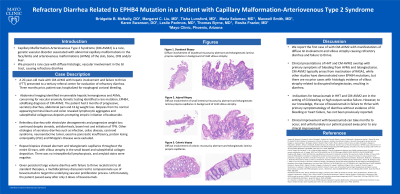Sunday Poster Session
Category: Small Intestine
P1589 - Refractory Diarrhea Related to EPHB4 Mutation in a Patient With Capillary Malformation-Arteriovenous Type 2 Syndrome
Sunday, October 27, 2024
3:30 PM - 7:00 PM ET
Location: Exhibit Hall E

Has Audio

Bridgette B. McNally, DO
Mayo Clinic School of Graduate Medical Education
Scottsdale, AZ
Presenting Author(s)
Award: Presidential Poster Award
Bridgette B. McNally, DO1, Margaret C. Liu, MD2, Rosita Frazier, MD2, Tisha N. Lunsford, MD2, Leslie Padrnos, MD3, Karen Lynne. Swanson, DO2, Thomas Byrne, MD3, Marcela A. Salomao, MD2
1Mayo Clinic School of Graduate Medical Education, Scottsdale, AZ; 2Mayo Clinic, Scottsdale, AZ; 3Mayo Clinic, Phoenix, AZ
Introduction: Capillary Malformation-Arteriovenous Type 2 Syndrome (CM-AVM2) is a rare, genetic vascular disorder associated with abnormal capillary malformations in the face and limbs and arteriovenous malformations (AVMs) of the skin, bone, central nervous system, and liver. We present a case of diffuse GI involvement causing refractory diarrhea, profound weight loss, and death.
Case Description/Methods: A 20-year-old male with CM-AVM2 with hepatic involvement and failure to thrive (FTT) presented for refractory diarrhea. He had 3 months of progressive, secretory diarrhea, abdominal pain, and 16 kg weight loss. Abdominal imaging showed innumerable hepatic hemangiomas and AVMs. Genetic testing identified a rare mutation, EPHB4, solidifying the diagnosis of CM-AVM2. Push enteroscopy showed small esophageal varices and white nummular gastric lesions; colonoscopy showed mucosal ulcerations and erythematous mucosa at the ileocecal valve, but no evidence of AVMs or aberrant vasculature. However, biopsies revealed aberrant, telangiectatic capillaries throughout the GI tract, villous atrophy in the small bowel and subepithelial collagen deposition without intraepithelial lymphocytosis. Amyloid stain was negative. Relentless diarrhea and progressive weight loss continued despite steroids, antidiarrheals, and TPN. Other etiologies such as infection, celiac, carcinoid syndrome, neuroendocrine tumor, exocrine pancreatic insufficiency, protein losing enteropathy and Whipple’s Disease were excluded. Repeat endoscopic evaluation showed similar findings on upper endoscopy but revealed multiple large angioectasis in the distal rectum. Given persistent diarrhea with FTT recalcitrant to standard therapies, a multidisciplinary discussion led to compassionate use of bevacizumab to target the underlying vascular process. Unfortunately, patient passed after only 2 doses.
Discussion: We report the first case of CM-AVM2 with diffuse GI mucosal involvement with abnormally formed capillaries, dilated/telangiectatic lesions leading to villous atrophy and subepithelial collagen deposition, causing large volume secretory diarrhea due to decreased intestinal surface area and absorptive capacity. Clinical presentations of Hereditary Hemorrhagic Telangiectasia (HHT) and CM-AVM2 overlap with symptoms of bleeding from AVMs/telangiectasias. To our knowledge, no cases have been reported with this degree of bowel. Indications for bevacizumab are in the setting of GI bleeding or high output cardiac failure and clinical improvement varies.

Disclosures:
Bridgette B. McNally, DO1, Margaret C. Liu, MD2, Rosita Frazier, MD2, Tisha N. Lunsford, MD2, Leslie Padrnos, MD3, Karen Lynne. Swanson, DO2, Thomas Byrne, MD3, Marcela A. Salomao, MD2. P1589 - Refractory Diarrhea Related to EPHB4 Mutation in a Patient With Capillary Malformation-Arteriovenous Type 2 Syndrome, ACG 2024 Annual Scientific Meeting Abstracts. Philadelphia, PA: American College of Gastroenterology.
Bridgette B. McNally, DO1, Margaret C. Liu, MD2, Rosita Frazier, MD2, Tisha N. Lunsford, MD2, Leslie Padrnos, MD3, Karen Lynne. Swanson, DO2, Thomas Byrne, MD3, Marcela A. Salomao, MD2
1Mayo Clinic School of Graduate Medical Education, Scottsdale, AZ; 2Mayo Clinic, Scottsdale, AZ; 3Mayo Clinic, Phoenix, AZ
Introduction: Capillary Malformation-Arteriovenous Type 2 Syndrome (CM-AVM2) is a rare, genetic vascular disorder associated with abnormal capillary malformations in the face and limbs and arteriovenous malformations (AVMs) of the skin, bone, central nervous system, and liver. We present a case of diffuse GI involvement causing refractory diarrhea, profound weight loss, and death.
Case Description/Methods: A 20-year-old male with CM-AVM2 with hepatic involvement and failure to thrive (FTT) presented for refractory diarrhea. He had 3 months of progressive, secretory diarrhea, abdominal pain, and 16 kg weight loss. Abdominal imaging showed innumerable hepatic hemangiomas and AVMs. Genetic testing identified a rare mutation, EPHB4, solidifying the diagnosis of CM-AVM2. Push enteroscopy showed small esophageal varices and white nummular gastric lesions; colonoscopy showed mucosal ulcerations and erythematous mucosa at the ileocecal valve, but no evidence of AVMs or aberrant vasculature. However, biopsies revealed aberrant, telangiectatic capillaries throughout the GI tract, villous atrophy in the small bowel and subepithelial collagen deposition without intraepithelial lymphocytosis. Amyloid stain was negative. Relentless diarrhea and progressive weight loss continued despite steroids, antidiarrheals, and TPN. Other etiologies such as infection, celiac, carcinoid syndrome, neuroendocrine tumor, exocrine pancreatic insufficiency, protein losing enteropathy and Whipple’s Disease were excluded. Repeat endoscopic evaluation showed similar findings on upper endoscopy but revealed multiple large angioectasis in the distal rectum. Given persistent diarrhea with FTT recalcitrant to standard therapies, a multidisciplinary discussion led to compassionate use of bevacizumab to target the underlying vascular process. Unfortunately, patient passed after only 2 doses.
Discussion: We report the first case of CM-AVM2 with diffuse GI mucosal involvement with abnormally formed capillaries, dilated/telangiectatic lesions leading to villous atrophy and subepithelial collagen deposition, causing large volume secretory diarrhea due to decreased intestinal surface area and absorptive capacity. Clinical presentations of Hereditary Hemorrhagic Telangiectasia (HHT) and CM-AVM2 overlap with symptoms of bleeding from AVMs/telangiectasias. To our knowledge, no cases have been reported with this degree of bowel. Indications for bevacizumab are in the setting of GI bleeding or high output cardiac failure and clinical improvement varies.

Figure: Duodenum: diffuse involvement of duodenal mucosa by aberrant and telangiectatic lamina propria capillaries in background of mild villous atrophy.
Jejunum: diffuse involvement of small intestinal mucosa by aberrant and telangiectatic lamina propria capillaries in background of mild villous atrophy.
Colon: Diffuse involvement of colonic mucosa by aberrant and telangiectatic lamina propria capillaries.
Jejunum: diffuse involvement of small intestinal mucosa by aberrant and telangiectatic lamina propria capillaries in background of mild villous atrophy.
Colon: Diffuse involvement of colonic mucosa by aberrant and telangiectatic lamina propria capillaries.
Disclosures:
Bridgette McNally indicated no relevant financial relationships.
Margaret Liu indicated no relevant financial relationships.
Rosita Frazier indicated no relevant financial relationships.
Tisha Lunsford indicated no relevant financial relationships.
Leslie Padrnos indicated no relevant financial relationships.
Karen Swanson indicated no relevant financial relationships.
Thomas Byrne indicated no relevant financial relationships.
Marcela Salomao indicated no relevant financial relationships.
Bridgette B. McNally, DO1, Margaret C. Liu, MD2, Rosita Frazier, MD2, Tisha N. Lunsford, MD2, Leslie Padrnos, MD3, Karen Lynne. Swanson, DO2, Thomas Byrne, MD3, Marcela A. Salomao, MD2. P1589 - Refractory Diarrhea Related to EPHB4 Mutation in a Patient With Capillary Malformation-Arteriovenous Type 2 Syndrome, ACG 2024 Annual Scientific Meeting Abstracts. Philadelphia, PA: American College of Gastroenterology.


